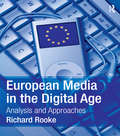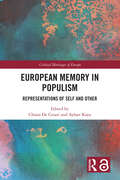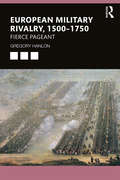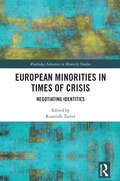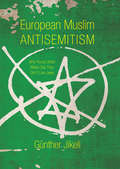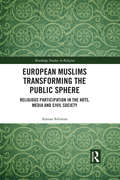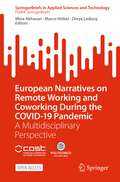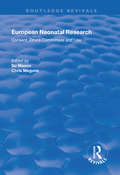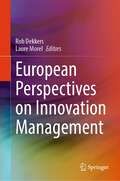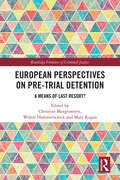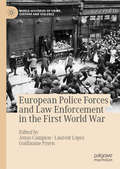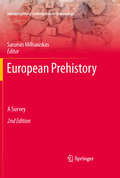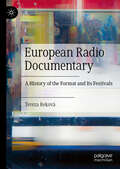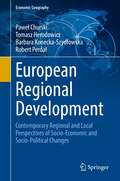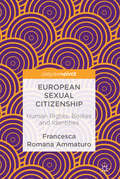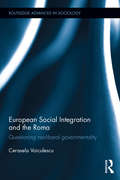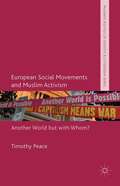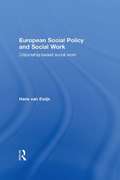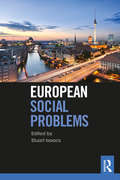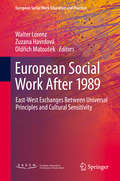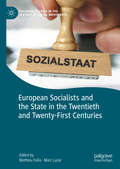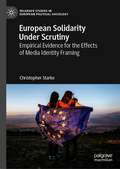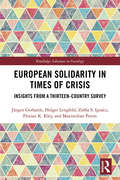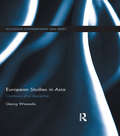- Table View
- List View
European Media in the Digital Age: Analysis and Approaches
by Richard RookeThis introductory textbook for Media and Communication Studies students is designed to encourage observation and evaluation of the European media in the digital age, enabling students to grasp key concepts and gain a broad and clear overview of the area. It also introduces the principal debates, developments (legislative, commercial, political and technological) and issues shaping the European media today, and examines in depth the mass media, digital media, the internet and new media policy. Understanding today's media scene from print to audiovisual needs a wider view and this book helps make comprehensible the European media within a broader global media landscape. The text is pedagogically rich and explores a variety of approaches to help the reader gain a better understanding of the European media world. Students are encouraged to start thinking about statistics, relating this to economics, analysing regulations, and combining media theories with theories of European Union integration. The book also includes the use of case studies, illustrations, summaries, critical reflections and directions to wider reading. The European Media in the Digital Age is recommended for all Media Studies students and is also of key interest to students of Politics and Policy, Business Studies, International Studies and European Studies
European Memory in Populism: Representations of Self and Other (Critical Heritages of Europe)
by Ayhan Kaya Chiara De CesariEuropean Memory in Populism explores the links between memory and populism in contemporary Europe. Focusing on circulating ideas of memory, especially European memory, in contemporary populist discourses, the book also analyses populist ideas in sites and practices of remembrance that usually tend to go unnoticed. More broadly, the theoretical heart of the book reflects upon the similarities, differences, and slippages between memory, populism, nationalism, and cultural racism and the ways in which social memory contributes to give substance to various ideas of what constitutes the ‘people’ in populist discourse and beyond. Bringing together a group of political scientists, anthropologists, and cultural and memory studies scholars, the book illuminates the relationship between memory and populism from different angles and in different contexts. The contributors to the volume discuss dominant notions of European heritage that circulate in the public sphere and in political discourse, and consider how the politics of fear relates to such notions of European heritage and identity across and beyond Europe and the European Union. Ultimately, this volume will shed light on how notions of a shared European heritage and memory can be used not only to include and connect Europeans, but also to exclude some of them. Investigating the ways in which nationalist populist forces mobilize the idea of a shared, homogeneous European civilization, European Memory in Populism will be of interest to scholars and students in the fields of European studies, heritage and memory studies, migration studies, anthropology, political science and sociology. Chapters 1, 4, 6, and 10 of this book are freely available as a downloadable Open Access PDF under a Creative Commons Attribution-Non-Commercial-No-Derivatives 4.0 license.
European Military Rivalry, 1500–1750: Fierce Pageant
by Gregory HanlonEuropean Military Rivalry, 1500–1750: Fierce Pageant examines more than 200 years of international rivalry across Western, Central, and Eastern Europe and the Mediterranean rim. The book charts the increasing scale, expenditure and duration of early modern wars; the impact of modern fortification on strategy and the movement of armies; the incidence of guerrilla war and localized conflict typical of the French wars of religion; the recourse by warlords to private financing of troops and supplies; and the creation of disciplined standing armies and navies in the age of Absolutism, made possible by larger bureaucracies. In addition to discussing key events and personalities of military rivalry during this period, the book describes the operational mechanics of early modern warfare and the crucial role of taxation and state borrowing. The relationship between the Christian West and the Ottoman Empire is also extensively analysed. Drawing heavily upon international scholarship over the past half-century, European Military Rivalry, 1500–1750: Fierce Pageant will be of great use to undergraduate students studying military history and early modern Europe.
European Minorities in Times of Crisis: Negotiating Identities (Routledge Advances in Minority Studies)
by Ruairidh TarvetOver the last decade, Europe has been struggling to cope with a series of significant and challenging global crises. Dramatic scenes from the so-called migrant crises, global financial crises, the Covid-19 pandemic and the war in Ukraine have sent shockwaves across Europe’s borders and have triggered drastic and sometimes even unprecedented responses from nation states. Caught between the shockwaves and counter-measures are Europe’s national minority communities. With little say or influence in national discussions on which measures to take in response to each crisis and often situated in peripheral or border regions, it is likely that these communities have been subjected to shifts in power balances and this may have even impacted their regional, national and transnational identities. By combining various sociological and anthropological methodologies with case studies from across northern, central, eastern and southern Europe, this book stresses the importance of listening to the unique concerns of minority communities in times of crisis. Starting in the Arctic Circle and working down in a reverse C-shape through Europe, each stop along the journey visits a different national minority community, where we learn about their multicultural, multilingual and transnational lifestyles and the distinct challenges they have faced in recent years. This book will be of interest to academics and researchers working in the areas of human geography, border studies, European studies, sociology, politics, minority studies and language studies.
European Muslim Antisemitism
by Günther JikeliAntisemitism from Muslims has become a serious issue in Western Europe, although not often acknowledged as such. Looking for insights into the views and rationales of young Muslims toward Jews, Günther Jikeli and his colleagues interviewed 117 ordinary Muslim men in London (chiefly of South Asian background), Paris (chiefly North African), and Berlin (chiefly Turkish). The researchers sought information about stereotypes of Jews, arguments used to support hostility toward Jews, the role played by the Middle East conflict and Islamist ideology in perceptions of Jews, the possible sources of antisemitic views, and, by contrast, what would motivate Muslims to actively oppose antisemitism. They also learned how the men perceive discrimination and exclusion as well as their own national identification. This study is rich in qualitative data that will mark a significant step along the path toward a better understanding of contemporary antisemitism in Europe.
European Muslims Transforming the Public Sphere: Religious Participation in the Arts, Media and Civil Society (Routledge Studies in Religion)
by Asmaa SolimanAnti-Muslim voices have become louder in many places in the midst of ongoing atrocities undertaken in the name of Islam. As a result, much of the creative participation of Western Muslims in the public sphere has become overshadowed. This tendency is not only visible in political discussions and the media landscape, but it is also often reflected in academia where research about Muslims in the West is predominantly shaped by the post 9/11 narrative. In contrast, European Muslims Transforming the Public Sphere offers a paradigm shift. It puts forward a new approach to understanding minority public engagement, suggesting that we need to go beyond conceptualisations that look at Muslims in the West mainly through the minority lens. By bringing into dialogue minority-specific and non-minority specific concepts, the book offers a relevant complement. Using young German Muslims engaged in media, the arts and culture and civil society as ten case studies, this book utilises the concepts of counterpublics and participatory culture to re-examine Muslims' engagement within the European public sphere. It presents a qualitative analysis, which has resulted from two years of ethnographic fieldwork and participant observation, in-depth interviews and primary source analysis of material produced by the research participants. This book is a unique insight into the outworking of multiculturalism in Western Europe. It illustrates the many-sidedness of young Muslims’ public contributions, revealing how they transform European public spheres in different ways. Therefore, it will be a vital resource for any scholar involved in Islamic Studies, the Sociology of Religion, Religious Studies, Cultural Studies and Media Studies.
European Narratives on Remote Working and Coworking During the COVID-19 Pandemic: A Multidisciplinary Perspective (SpringerBriefs in Applied Sciences and Technology)
by Mina Akhavan Marco Hölzel Divya LeducqThis open access book offers a multidisciplinary and comprehensive perspective regarding the immediate and long-term effects of the Covid-19 pandemic on coworking spaces in the European Region. The current pandemic has imposed several effects on work and spaces for work. Some are immediate effects and will last for a short time (such as the closing down of the space), some will last longer (namely, the reorganisation of the space to meet the physical distancing), and some will stay for a long time (remote working and hybrid working). Although the literature on coworking spaces and the effects of the pandemic is growing fast, empirical studies are yet limited. Within this context, this book seeks a twofold aim: (i) to contribute to the fast-growing literature on coworking space and their effects at different scales; (ii) to present a multidisciplinary perspective about the effects of the yet-lasting Corona-pandemic effects on the patterns of remote working and consequently on coworking spaces, as the most diffused form of new working spaces.
European Neonatal Research: Consent, Ethics Committees and Law
by SU MASON and CHRIS MEGONEThis title was first published in 2001. An important book presenting the results of the European Union funded EURICON project in biomedical ethics. Involving experts in eleven countries, this project was motivated by European neonatal clinicians’ concerns about the problem of obtaining informed consent in neonatal research. It addressed the difficulties of obtaining consent from subjects involved in such research, and investigated the relevance and appropriateness of obtaining consent from parents. The project also examined the work of Research Ethics Committees in Europe. It explored their responses to EURICON’s analysis of the views of clinicians and parents, and their attitudes towards the relevant laws and legal requirements. The wide geographical scope of the project enabled international comparisons of the opinions of clinicians and parents, the legal frameworks governing neonatal research, and the effectiveness of Research Ethics Committees. This is the first such investigation on a European scale, and it offers a unique interdisciplinary approach to these issues. Incorporating clinical, ethical, legal and sociological perspectives, the results and recommendations presented in this book will be of widespread significance to practitioners, researchers and policy makers throughout Europe and beyond.
European Perspectives on Innovation Management
by Laure Morel Rob DekkersThis book covers European perspectives on innovation management, including new product and service development, due to the inherent variety of socio-economic perspectives and institutional settings in Europe. The numerous settings and differing perspectives explored in the chapters exemplify diversity, which ultimately leads to enhancing innovation. Understanding such unique approaches will enable companies, universities and other actors to more effectively create innovative products and services, and policy makers to effectively stimulate growth and innovation. The fragmented, distributed economies in Europe also put a strong focus on internationalisation, including innovation management, new product and service development, even within the internally open market of the European Economic Area. European Perspectives on Innovation Management will be of help to researchers, managers, entrepreneurs, practitioners and students working on innovation management and practices embedded in national and regional innovation systems, thus fostering a more innovative Europe.
European Perspectives on Pre-Trial Detention: A Means of Last Resort? (Routledge Frontiers of Criminal Justice)
by Mary Rogan Christine Morgenstern Walter HammerschickHigh levels of remand or pre-trial detention (PTD) is a matter of growing concern in many countries, and at a European level. Despite being responsible for a significant part of the prison population, PTD practice is rarely the focus of criminological and criminal justice research. This book examines pre-trial detention practices and different ways of reducing its use across Europe. Offering a range of country-specific studies, this book also offers comparative studies of major issues across the continent. In particular, this book illustrates and examines how the actors (judges, public prosecutors, defence lawyers) work in pre-trial proceedings and make decisions; the common challenges in PTD decision-making; the factors which explain higher and lower rates of PTD across Europe; similarities and differences in practice; and the ways in which cross-border cases within the European influence policy and practice. Offering suggestions and recommendations for how to bring down the use of PTD in Europe, this book is essential reading for all those engaged with European penal research and practice.
European Police Forces and Law Enforcement in the First World War (World Histories of Crime, Culture and Violence)
by Jonas Campion Laurent López Guillaume PayenThis book offers a global history of civilian, military and gendarmerie-style policing around the First World War. Whilst many aspects of the Great War have been revisited in light of the centenary, and in spite of the recent growth of modern policing history, the role and fate of police forces in the conflict has been largely forgotten. Yet the war affected all European and extra-European police forces. Despite their diversity, all were confronted with transnational factors and forms of disorder, and suffered generally from mass-conscription. During the conflict, societies and states were faced with a crisis situation of unprecedented magnitude with mass mechanised killing on the battle field, and starvation, occupation, destruction, and in some cases even revolution, on the home front. Based on a wide geographical and chronological scope – from the late nineteenth century to the interwar years – this collection of essays explores the policing of European belligerent countries, alongside their empires, and neutral countries. The book’s approach crosses traditional boundaries between neutral and belligerent nations, centres and peripheries, and frontline and rear areas. It focuses on the involvement and wartime transformations of these law-enforcement forces, thus highlighting underlying changes in police organisation, identity and practices across this period.
European Prehistory
by Sarunas MilisauskasEuropean Prehistory: A Survey traces humans from their earliest appearance on the continent to the Rise of the Roman Empire, drawing on archaeological research from all over Europe. It includes the Paleolithic, Mesolithic, Neolithic, Bronze and Iron Ages. Throughout these periods, the major developments are explored using a wide range of archaeological data that emphasizes aspects of agricultural practices, gender, mortuary practices, population genetics, ritual, settlement patterns, technology, trade, and warfare. Using new methods and theories, recent discoveries and arguments are presented and previous discoveries reevaluated. This work includes chapters on European geography and the chronology of European prehistory. A new chapter has been added on the historical development of European archaeology. The remaining chapters have been contributed by archaeologists specializing in different periods. The second edition of European Prehistory: A Survey is enhanced by a glossary, three indices and a comprehensive bibliography, as well as an extensive collection of maps, chronological tables and photographs.
European Radio Documentary: A History of the Format and Its Festivals
by Tereza RekováThis book studies the history and significance of radio documentaries in Europe, and the institutions that are specialized on this genre. Focused on the 50-year history of the International Feature Conference (an annual gathering of radio documentarians from around the world), the book discusses the Prix Europa, Prix Italia, the Third Coast International Audio Festival, and the HearSay Audio Arts Festival. The book tells the story of people who chose sound as their lifestyle and who spread their passion worldwide.
European Regional Development: Contemporary Regional and Local Perspectives of Socio-Economic and Socio-Political Changes (Economic Geography)
by Paweł Churski Tomasz Herodowicz Barbara Konecka-Szydłowska Robert PerdałThis book offers a comprehensive overview of contemporary issues of regional development. It places particular emphasis on its socio-economic and socio-political determinants which accompany the problem of existing and ever-widening differences in the level of regional development in various parts of Europe. In order to diagnose the scale of those differences and to indicate the main forces behind the divergence of development, the authors propose an original systematisation of regional development factors, drawing attention to the need to consider them within the framework of present-day socio-economic megatrends. The proposed approach to the development factors is also used for the author's operationalisation of the concept of territorial capital, which is at the centre of regional place-based policy. The wide spatial aspect of the analysis (national and local) and its extensive temporal scope (2004-2019) yields unique results and creates an important element of added value for this book, which shows the regularities of the process of regional development in Europe at three spatial levels - pan-European, national and intra-regional. Furthermore, it indicates the challenges faced by regionalists who attempt to carry out research on different territorial levels with a diverse number of units (205 EU regions, 16 Polish voivodeships, 2,478 Polish local units) and extended observation periods (2004-2017). The solutions proposed by the authors, who show the potential of overcoming the barriers resulting from limited access to complete and comparable statistical data series, should be inspiring for many researchers. The unique results of direct research carried out on a large sample of respondents and entrepreneurs via diverse field research techniques constitute a valuable source of information on local conditions that impact contemporary development processes in less developed regions. Their value is even greater because they were carried out in a unique laboratory created by the authors for testing the regularity of formation and impact of socio-economic development factors in various locally determined conditions of this process. It consists of purposefully selected test units (LAU2). Located in a less developed region, they represent all growth types and functional test units identified in the course of the research. Consequently, the results obtained may be generalised and applied to other areas showing similar features of territorial capital. The monograph is addressed primarily to a wide group of regionalists connected with economic and social sciences as well as to practitioners involved in the implementation of development policies at various levels.
European Sexual Citizenship: Human Rights, Bodies and Identities
by Francesca Romana AmmaturoThis book is an innovative and critical contribution to the study of the human rights of lesbian, gay, bisexual, transgender, intersex and queer (LGBTIQ) people in the context of Europe. Combining legal and Foucauldian approaches, it investigates the ways in which current discourses about LGBTIQ rights in Europe are tightly bound to contemporary debates about national and trans-national citizenship. The author defines and analyzes the concept of 'multisexual citizenship' to illustrate new, flexible forms of sexual and gendered citizenship that could radically transform practices of citizenship and the current human rights framework in Europe. She does this by combining critical deconstructions of the case law of the European Court of Human Rights with ethnographic observations and sociological analysis. This interdisciplinary work will appeal to sociologists, lawyers and researchers of gender and LGBTIQ rights.
European Social Integration and the Roma: Questioning Neoliberal Governmentality (Routledge Advances in Sociology)
by Cerasela VoiculescuIn the field of political sociology and European studies, there has long been a discussion on transnational neoliberal development and ethnic groups’ self-governance. Notwithstanding, there has been limited exploration in relation to modes of knowledge production associated with neoliberal governance of the Other (e.g. ethnic and indigenous groups), which capture its idiosyncratic modes of political expression and empowerment. Drawing on Michel Foucault’s political philosophy, this book discusses European social integration as transnational neoliberal governmentality and challenges its epistemologically constituted subaltern subject. Neoliberalism is questioned in relation to its programs of securitisation of poverty and authoritarian models of self-governance associated with instrumentality of the market. In this context, the book’s rich political historical ethnography develops a new framework for the study of social power. Furthermore, inspired by Jacques Rancière's radical philosophy, European Social Integration and the Roma proposes a new mode of knowledge production about populations excessively subjected to neoliberal governmentality, heralding the epistemological decolonisation of the neoliberal subject. Presenting an insightful new prospect in critical sociology as well as the conceptualization of power and the application of theories of governmentality, this book will appeal to scholars interested in the areas of political sociology and anthropology, international relations, social and political theory/philosophy and post-development studies.
European Social Movements and Muslim Activism
by Timothy PeaceHow do progressive social movements deal with religious pluralism? In this book, Timothy Peace uses the example of the alter-globalisation movement to explain why social movement leaders in Britain and France reacted so differently to the emergence of Muslim activism.
European Social Policy and Social Work: Citizenship-Based Social Work
by Hans van EwijkEuropean Social Policy and Social Work explores shifts in international social policies and how they affect national trends and thus the context for social work practice. The book discusses international and national social work strategies and practice and investigates the responsibilities for social welfare held by the state, the market and civil society. Hans van Ewijk then elaborates a new concept of citizenship-based social work which supports and encourages self-responsibility, social responsibility and the implementation of social rights. The main themes covered are: international social policy and social work from welfare to workfare citizenship essentials of citizenship based social work community policy and community work social work and alternative areas of activity such as youth care and social care. Integrating different roots and social professions in an overarching new concept, this book particularly looks at European Union countries. Hans van Ewijk examines debates regarding social work as an internationally recognised profession and science. This book is suitable for social work students, academics and professionals with an interest in social policy and international social work.
European Social Problems
by Stuart IsaacsEuropean Social Problems is the first book to examine social issues in Europe from the perspective of the social sciences. It considers many of these social problems following the UK’s ‘leave’ vote. Key topics examined here include: immigration; multiculturalism and religion; health; inequalities; education; riots and protest; drugs and crime; sexuality. These core issues run as a thread through Europe and are experienced by Europeans themselves as social problems. As such, this text facilitates students’ direct engagement with some of the problematic constituents in their own lives. This text is suitable for those studying social policy, sociology, politics, international relations, criminology and education studies. In this way it functions as an accessible ‘reader’ for final year undergraduates as well as postgraduate students.
European Social Work After 1989: East-West Exchanges Between Universal Principles and Cultural Sensitivity (European Social Work Education and Practice)
by Walter Lorenz Zuzana Havrdová Oldřich MatoušekThis book presents a unique analysis of the learning derived from East-West contacts in social work and reflects on the discipline's inalienable trans-national dimensions, of high actuality in the face of the re-emergence of nationalisms. The fundamental transformations in Europe subsequent to the revolutions of 1989 had a profound impact on social work in terms of raising sharply the profession’s relationship with politics. The exchanges between western schools of social work and the emergent academic partner institutions in former Communist countries formed a valuable testing ground for the essential principles and competences of social work in terms of their universal scientific basis on the one hand and their regard for cultural and national values and contexts on the other. The chapters in this contributed volume focus on lessons derived from fundamental social and political transformations, highlighted by East-West encounters and intra-national divisions, and thereby have important messages for mastering impending transformations in the light of the global COVID-19 health crisis. They demonstrate how cultural and social divisions can be addressed constructively with direct implications for training and practice in dramatically changing contexts:Lithuanian social work’s claim to professional autonomy vs. authoritarianism in popular and political culture Social work between civil society and the state – lessons for and from Hungary in a European contextWhen Europe’s East, West, North and South meet: learning from cross-country collaboration in creating an international social work master programmeNordic-Baltic cooperation in social work researcher education: A Finnish perspective on the impact on scientific, historical and linguistic similarities and differencesIntra-national similarities and differences in social work and their significance for developing European dimensions of research and educationSocial work, political conflict and European society: reflections from Northern Ireland European Social Work After 1989: East-West Exchanges Between Universal Principles and Cultural Sensitivity is an invaluable resource for social work educators; social work practitioners confronted with national and international divisions; students of social work, of social administration and policy; and any policy researcher with a comparative focus.
European Socialists and the State in the Twentieth and Twenty-First Centuries (Palgrave Studies in the History of Social Movements)
by Mathieu Fulla Marc LazarThis edited volume promotes a comparative and transnational approach to the complex and ambiguous relationship between West European socialism and the contemporary state over the longue durée. It encourages a better understanding of socialism while also casting an original light on the history of the contemporary state in Europe. Socialists have been a prime political force since the late nineteenth century through to the present. Through their strength, their presence at the heart of societies, their dynamism, inventiveness, and influence, they have left their mark on the European physiognomy and helped to forge part of its identity. This is particularly true where the welfare state is concerned, and the role played by the state in constructing, embedding, and extending this social model. Surprisingly, there has been no research aiming to systematically analyse the relationship between socialism and the state. This volume fills a gap in knowledge by rejecting the media simplification and political polemic maintained by opponents of socialism – and sometimes by socialists themselves – which systematically links socialism with “statism”. It focuses on numerous case studies involving France, Italy, Spain, Greece, Austria, Germany, Belgium, the United Kingdom and Scandinavia, and highlights the diversity of organisations within European socialism. Ultimately, this book demonstrates that the fate of this political culture depends on the socialist parties themselves but also on any new configurations that states may assume. Conversely, the future of states will also depend partly on the choices made by socialists, if they still exist and still have the means to shape decisions and make their voices heard.
European Solidarity Under Scrutiny: Empirical Evidence for the Effects of Media Identity Framing (Palgrave Studies in European Political Sociology)
by Christopher StarkeThis book explores the processes through which European solidarity is constructed. More specifically, it investigates how the media's framing of European identity can facilitate and/or impede the emergence of European solidarity on the individual level. Through an online experiment that tested the effect of two different media identity frames on individual solidarity during the European debt crisis, the author argues that the exposure to news articles using a value-based identity frame boosts solidarity compared to an economic identity frame. This interdisciplinary work will be of interest to scholars of political sociology, political communication and political psychology, as well as any researchers who study European integration.
European Solidarity in Times of Crisis: Insights from a Thirteen-Country Survey (Routledge Advances in Sociology)
by Jürgen Gerhards Zsófia Ignácz Holger Lengfeld Florian K Kley Maximilian PriemThe euro crisis, several sovereign debt crises, the Great Recession, the refugee crisis, and Brexit have all challenged Europeans’ willingness to show solidarity with other European citizens and member states of the European Union. European Solidarity in Times of Crisis provides a clear theoretical framework to understand European solidarity for the first time. It offers a systematic empirical approach to determine the strength and causes of European solidarity. The authors distinguish between four domains of solidarity and test a set of theoretically derived criteria with a unique dataset to investigate European solidarity. Based on a survey conducted in thirteen EU member states in 2016, the empirical analysis leads to some unanticipated results. Europeans display a notably higher degree of solidarity than many politicians and social scientists have presumed so far. This especially applies to the support of people in need (welfare solidarity) and the reduction of territorial disparities between rich and poor EU countries (territorial solidarity), but also to the domain of fiscal solidarity (financial support of indebted EU countries). This optimistic view is less true for the domain of refugee solidarity. While citizens of western and southern EU countries accept the accommodation of refugees and their allocation between European countries, the majority of people in eastern European countries do not share this point of view. The book will appeal to students and scholars in fields such as comparative sociology, political science, social policy and migration research, and European studies. It is also relevant to a non-academic audience interested in the development of the European project.
European States and Their Muslim Citizens
by John R. Bowen John R. Bowen Christophe Bertossi Jan Willem Duyvendak Mona Lena Krook Christophe Bertossi Jan Willem DuyvendakThis book responds to the often loud debates about the place of Muslims in Western Europe by proposing an analysis based in institutions, including schools, courts, hospitals, the military, electoral politics, the labor market, and civic education courses. The contributors consider the way people draw on practical schemas regarding others in their midst who are often categorized as Muslims. Chapters based on fieldwork and policy analysis across several countries examine how people interact in their everyday work lives, where they construct moral boundaries, and how they formulate policies concerning tolerable diversity, immigration, discrimination, and political representation. Rather than assuming that each country has its own national ideology that explains such interactions, contributors trace diverse pathways along which institutions complicate or disrupt allegedly consistent national ideologies. These studies shed light on how Muslims encounter particular faces and facets of the state as they go about their lives, seeking help and legitimacy as new citizens of a fast-changing Europe.
European Studies in Asia: Contours of a Discipline (Routledge Contemporary Asia Series)
by Georg WiessalaAs countries across Asia continue to rise and become more assertive global powers, the role that Higher Education has played, and continues to play, in this process is an issue of growing pertinence. Furthermore, understanding the relationship between Europe and Asia fostered by historical and contemporary knowledge transfer, including Higher Education, is crucial to analysing and encouraging the progress of both regional integration and inter-regional cooperation. With a specific focus on international Higher Education, European Studies in Asia investigates knowledge transfer and channels of learning between Europe and Asia from historical, contemporary and teaching perspectives. The book examines a selection of significant historical precedents of intellectual dialogue between the two regions and, in turn, explores contemporary cross-regional discourses both inside and outside of the official frameworks of the European Union (EU) and the Asia--Europe Meetings (ASEM). Drawing on extensive case studies based on many of his own teaching experiences, Georg Wiessala addresses key questions, such as the nature and construction of the European Studies in Asia curriculum; aspects of ‘values’, co-constructed learning and adult pedagogy in the discipline of European Studies in Asia; the politics of Asian host cultures, the ‘internationalization’ of Asian Higher Education and the experiences and expectations of tertiary sector students of this subject in Asia, Australia and New Zealand. In doing so, the author articulates a range of outcomes for the further development of Higher Education cooperation agendas between Asia and Europe, in the discipline of European Studies, and in related fields such as International Relations. This case study-led book makes an original and novel contribution to our understanding of European Studies in Asia. As such, it will be of great interest to students and scholars of Asian Education, Comparative Education, European Studies and International Relations.
